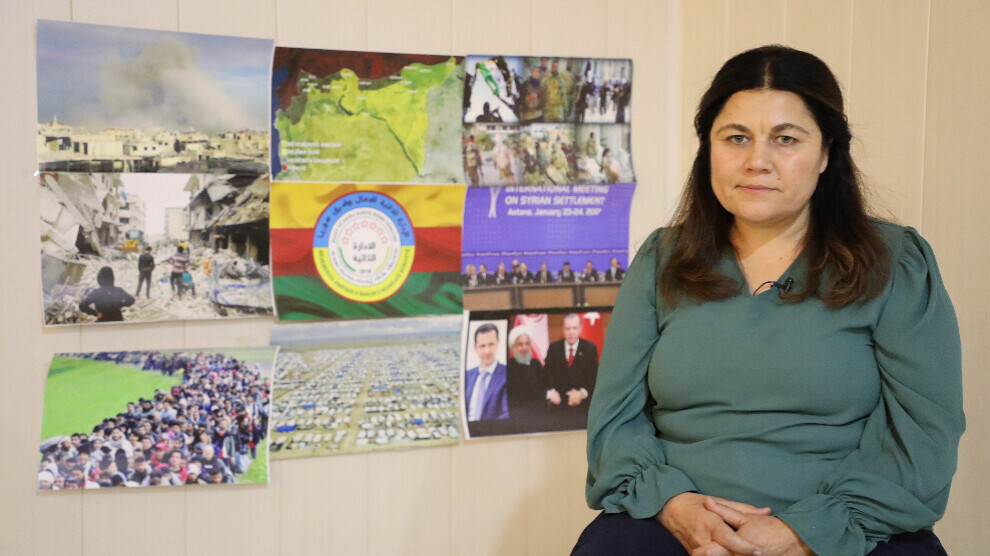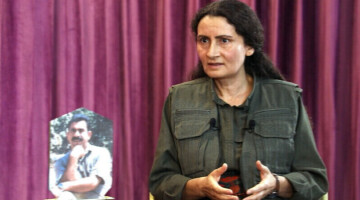What happened in Syria before and after 2011? What is the situation called the Syrian crisis? Who led to the deepening of the crisis, who made an effort for a solution? Democratic Union Party (PYD) Co-Presidency Council member Foza Yusif answered these questions to ANF.
What is the situation caused by the so-called 'Syria problem or Syria crisis'?
The so-called Syrian problem is the absence of a democratic system, of personal, religious and women's rights. This is the problem of all states in the region. The absence of such a system paved the way for many political and economic problems. This caused social crises. The reality of the nation-state in the Middle East is that the dominant powers that won the war after the First World War established countries based on racism, religion and sexism. One of these nation-states was Syria, which was torn apart in this war. The Syrian state was based on the nation-state mentality. Likewise, Kurds, Armenians, Assyrians and all peoples living in Syria were denied. This led to political and religious problems as well as great pressures over time. During the past period, there has been great unrest in society and especially among the peoples of Syria. Positive and negative situations throughout Syria, and the discomfort against this undemocratic system in Syrian society led to the start of the 2011 uprising. We can say that Syria's main problem is connected to the nature of the nation-state, or, in other words, the lack of a democratic system.
2011 is the date given for the beginning of the crisis. Wasn't there a Syrian problem before?
There were problems before 2011 as well. For example, the racist politics in Rojava in 2004. Radical groups that emerged in many regions were also a reason for problems. We had serious sexism issues. The situation in 2011 exploded with the bankruptcy of the nation-states throughout the Middle East. This process was called the Arab spring. In Syria, the bankruptcy of the nation-state was clearly revealed. The nation-state was no longer able to run itself, and there was a need to establish a new system with changes and transformations. There was a great difficulty not only for the Kurds, but also for all the peoples of Syria. The interesting thing is that this activity started in Deraa. This shows that the Syrian problem has reached an intolerable level. In this direction, the 2011 popular movement and the uprising emerged.
The people had many demands. The main demand was equality. For this, the system needed to be changed. Again there were requests for dialogue. Because there was great poverty and injustice. There was no freedom, there was great pressure. Each region had an intelligence and security system. Kurdish identity was denied in Kurdish regions, there were economic and democracy problems. Democracy, economic and social problems were deep in many Arab areas. Social identity was denied. When all these were brought together, there was a demand from the people to establish a system that would cover the rights of all Syrian peoples.
What is the damage caused since the 2011 uprising?
The crisis has caused great suffering and destruction in 12 years. Millions of people had to migrate, hundreds of thousands were killed and hundreds of thousands injured. Major destruction occurred in Syria's infrastructure and some cities were completely destroyed. The ISIS war and the prolongation of the Syrian problem have had negative effects on Syrians and have caused them to leave their homes. Poverty exacerbated all this. More than half of the people living in Syria are in poverty. There was great damage in the fields of science and education. All this destruction has created a wounded society. People have been living with these problems for 12 years, and all of this leads to bigger crises.
Who and what forces were involved in this situation? What caused foreign interventions?
If the Syrian government had followed a peaceful, democratic and dialogue method to solve this issue, the situation might have been different. The intervention of foreign powers also developed as a result of the government's violent attitude towards popular movements. With foreign interventions, everyone intervenes according to their own interests. Turkey's intervention was through the Front Al Nusra and other groups. After ISIS, coalition forces intervened. After 2015, Russia intervened. After 2014-2015, the Syrian problem clearly turned from a domestic problem to a regional and international issue. Because many forces are positioned in Syria, it has become a regional and international issue. The intervention by different powers and groups led to even more clashes, which put the Syrian crisis on a longer and more difficult path.
This crisis has two sides. The first is the government forces in Damascus and the forces in Syria, which have no will for a solution for Syria. The Damascus administration has always avoided a solution, and the powers that define themselves as opposition have given all their weight to foreign powers. Eventually, they came to act under the initiative of foreign powers. The emerging Syrian coalition, opposition forces, Ceyşul Hur and most of the gang groups pursued personal politics. The forces in Northern and Eastern Syria have worked hard for a democratic solution to the Syrian crisis. But this has always been overlooked, ignored. They were not included in any international platform where Syria was discussed. This resulted in the absence of Syrian power and a will for a solution.
The second side is represented by the international powers that use the Syria issue for their own benefit. They wanted to solve a crisis with a crisis. International and local powers have a great responsibility in the Syrian problem. The negotiations in Geneva collapsed because they did not have the right strategy. Neither did Astana, nor did Sochi... Many initiatives developed, but due to the interests of international powers, they did not want the Syrian crisis to be resolved and extended its duration. These have left Syria faced with such a situation today. The will for a solution did not emerge due to the actors in Syria and the current lack of will, but also because of the role of international powers, that wanted to create more turmoil in Syria.
How did the Autonomous Administration participate and contribute to the solution of the problem?
The Northern and Eastern Syria Autonomous Administration promoted a solution initiative. It wanted to present its solution project in the current political situation. Because the Autonomous Administration is an important force in Syria today.
30 percent of the peoples of Syria are governed under the roof of the Autonomous Administration. Not only did it have a solution project, but it also stood out as a political and military force. Therefore, the Autonomous Administration initiative is important. The Autonomous Administration has once again stated that it is responsible not only to the people of Northern and Eastern Syria, but to the entire Syrian people. In short, it is putting its will to the fore in solving the Syrian problem.
The Autonomous Administration has implemented an advanced governance model. But this has always been overlooked, ignored. It is obvious that a solution cannot be successful without the Autonomous Administration. This is the only model that can respond to all Syrian peoples. It also plays an important role for Arab countries. The Autonomous Administration warned everyone not to make mistakes made in Astana and Sochi again.















